Straits Times, 16 Apr 2022, Are memes good or bad?
Log onto social media and a cheeky meme is likely to greet you within seconds.
It might be a provocative, often ironic headline framing a breaking news item. Or a Hollywood movie clip, subtitles included, commenting on something as banal as the weather. Or a satirical cartoon lampooning a public figure, policy or general human inaptitude.
In most cases, the meme would likely have already gone viral.
Memes are now a prominent form of communication online, offering snippets of humour for today's impatient, unfocused social media scrollers, hungry for a hit of excitement before they move on.
But the attention-grabbing and often reductive nature of memes designed to trigger netizens into liking and sharing them has led many to label meme culture "toxic".
This is because images used in memes are often disconnected from their original context.
When the images come from violent or sensitive contexts, the memes belittle the sense of distress originally depicted in these images, says Ms Barbara Sanchez, a University of Florida graduate student, in an essay published in the American journal, Pathways: A Journal of Humanistic and Social Inquiry.
Memes are also widely criticised for not taking weighty issues seriously, and amplifying misinformation and xenophobia.
In the earlier days of Covid-19, for example, some memes spread spurious claims and quack cures.
In 2020, a popular meme, which used the music video of Canadian rapper Drake's Hotline Bling, claimed that a Covid-19 vaccine will modify a person's DNA. This claim was swiftly debunked, but not before naive viewers lapped it up to their own detriment.
Memes can have their good
But despite their misuse, memes have many defenders.
One is Dr Jeremy Sng, a lecturer at Nanyang Technological University's School of Social Sciences.
The 33-year-old, whose research focuses on the psychological and behavioural outcomes of media use, believes several criticisms fired at meme culture, such as it contributing to misinformation and poking fun at authority figures, are not fair.
"Making jokes at the expense of others, including those in power, is something people have done in private conversations and coffee-shop talk long before memes came about. So, it is a bit unfair to blame this solely on memes.
"Memes are also not the only type of content contributing to misinformation," he says.
In his view, memes have benefited society in several ways.
For example, in the recent invasion of Ukraine, many Ukrainians used memes to share their sentiments about the war, and the irony and satire expressed helped their fellow countrymen cope with the stress, loss and uncertainty around them.
In Singapore, some government organisations have also used memes to push out public education messages.
For example, in 2018, the Singapore Civil Defence Force posted a tongue-in-cheek meme featuring an ostentatious fall by Brazilian footballer Neymar at the World Cup then, widely criticised as him over-acting, to teach netizens to "stop, drop and roll" if their clothes ever catch fire.
Using memes in this way is effective, he notes, as they subvert the official or serious tone associated with official announcements.
"But such memes have to be made tactfully or people may think the organisations are trivialising the issue, and may not take well to it," he adds.
For Dr Sng, scrolling through memes, especially those that focus on current affairs, celebrity news and dating, is among the main reasons he uses Instagram.
Many memes, he notes, have a self-deprecating bent and resonate with the masses because they portray common problems faced by ordinary folk.
A double-edged sword
The term "meme" was coined in 1976 by British evolutionary biologist Richard Dawkins.
Simply put, memes refer to ideas, or behaviours, that spread from person to person through methods such as writing, speech or gesture, often by means of imitation.
Ms Leah Selakovic, a psychologist at SACAC Counselling, a mental health clinic here, says it is hard to pronounce judgment on the exact impact of meme culture because it is so intangible.
"Memes are able to spread both useful information and misinformation. So, the only reasonable conclusion is that meme culture, and by extension social media and the Internet, is a double-edged sword, just like any other tool.
"Many supposed 'toxic' aspects of meme culture are also arguably not caused by it. Rather, these elements may be manifestations of unhealthy beliefs which are seen through memes precisely because of their accessibility."
Online media monitoring company Meltwater, whose Asia-Pacific headquarters are based in Singapore, has found that on social media, positive memes generally outnumber negative ones, but positive ones often do not achieve the same level of virality.
Mr Mimrah Mahmood, a senior director and partner at Meltwater, explains this might be because negative memes touch on controversial topics, which attract greater public attention. "Positive or inspirational memes do not drive the same level of interest," he says.
Positive narratives, such as those advocating for social safety or environmental consciousness, also tend to be driven by the likes of non-governmental organisations, which may lack the resources or tools to amplify their agendas compared with for-profit companies.
Memes to boost brand presence
To be sure, most of today's memes are generated by profit-motivated companies which propagate narratives that suit their interests.
Mr Benjamin Soubies, 36, managing director of Asia-Pacific and Japan at consumer intelligence company Talkwalker, says there is much potential for brands to connect with consumers through memes.
According to Talkwalker's analysis, via its consumer intelligence platform, at least 9,000 memes have been created from a single frame from the South Korean drama Squid Game (2021 to present), where a character almost trips, but is held back by another character, hence escaping death.
"Brands staying on top of social media trends caught wind of this meme fever early and were quick to launch their own Squid Game-inspired publicity campaigns, increasing their brand's relevance to popular culture and bringing them closer to consumers," he adds.
Memes represent a collective sentiment
Spread and rapidity is the nature of the meme game, it seems.
Mr Tey Beng Huan, 46, a lecturer at Temasek Polytechnic's Centre for Applied Behavioural & Social Sciences, notes that the Internet has allowed memes to spread much more widely and quickly, compared with when people encountered memes as political cartoons in print media or in conversations with immediate social circles.
Memes - then and now - express an individual or perceived collective sentiment. In this context, today's Internet memes are likely no more negative than those found in public forums of the past, he says.
Considering the volume of content on cyberspace, it would be hard to cut back on the negative slant of some memes, he adds.
"This would be akin to stopping the conversations at a party just because too many people are griping about their jobs, marriage or kids."Rather, the onus is on the authorities and channel owners to keep watch and take action against any harmful or false content."
Experts dissect seven memes
The experts
YWQ: Associate Professor Yow Wei Quin from Singapore University of Technology and Design’s Humanities, Arts and Social Sciences cluster
LS: Ms Leah Selakovic, a psychologist at SACAC Counselling, a mental health clinic here
JL: Assistant Professor of Social Sciences (Psychology) Jean Liu from Yale-NUS College
From Lobang Siah
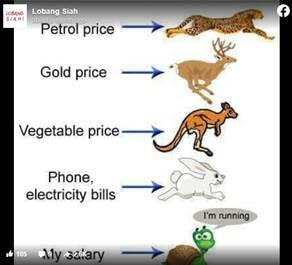
YWQ: This meme is successful because it is simple, highly relevant and evokes strong emotions, such as anxiety over whether one's salary can keep up with inflation.
Since it went viral, it could be a genuine reflection of sentiments or concerns on the ground.
LS: There is a strong focus on being "relatable" as well as self-depreciating.
This approach likely stems from a desire to find humour in one's troubling circumstances, which is not particularly unique to memes, but is possibly part of the very nature of humour itself.
From MustShareNews.com
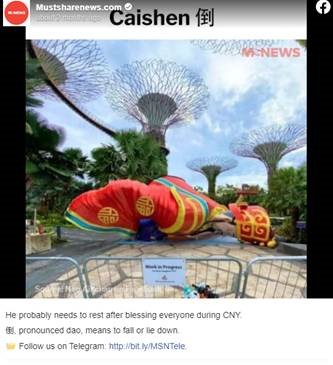
JL: Some memes focus on the element of surprise, and are funny because people do not expect it.
Here, no one expects to see a giant inflatable caishen (god of fortune) on the floor.
The meme's author paired the image with a pun, and you cannot help but laugh.
From Vision 2020: An Inspiration for Youth
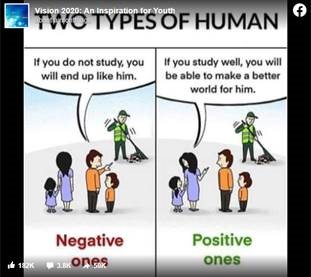
YWQ: This meme is simple, relevant and depicts a very stereotypical way of how parents encourage their children to study harder.
At the same time, it encourages viewers to change their mindset and proposes an alternative way to achieve the same objective.
From SGAG

JL: Memes often come to life during stressful situations, for example, when reality does not square up with expectations.
Here, there is a sense of irony and the humour helps one cope.
Research studies have documented how a person who uses humour to cope with stress tends to have better psychological well-being.
From Civil Engineering Ideas
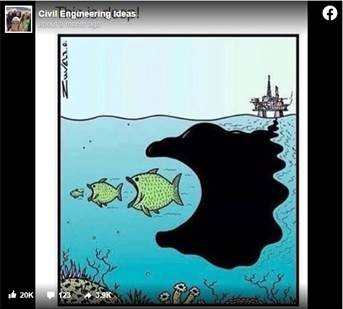
YWQ: This meme likely arouses some level of anxiety about how pollution can upset the ecological balance and, ultimately, people's lives.
It can create a positive impact on society by raising awareness about the effects of pollution and hopefully encourage viewers to take steps to reduce the damage.
From Nerdy Space
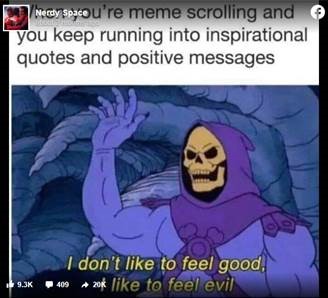
LS: This meme focuses on being relatable without aspiring to convey any particular message. It uses the fictional character Skeletor from the Masters Of The Universe media franchise to comment on how viewers prioritise memes that are entertaining over ones that can be considered "inspiring".
JL: Some memes provide a commentary of a social phenomenon, which in this case, may be a culture of people sharing lots of happy-clappy messages that deny the hardships of reality.
From Mothership.sg
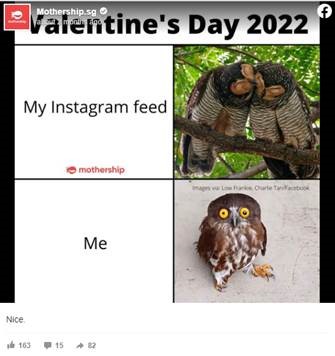
YWQ: This is an interesting meme that reflects how people tend to present themselves on social media. They are inclined to show only positive messages - even if it is possibly untrue - in a bid to look good.
The meme can also be interpreted as raising awareness of the danger of over-relying on social media to establish one's identity and self-worth.